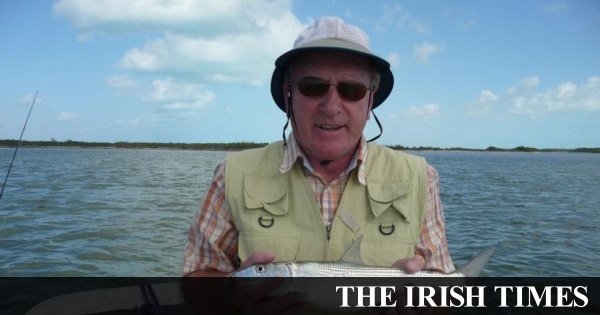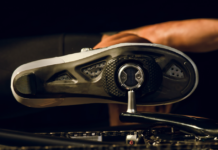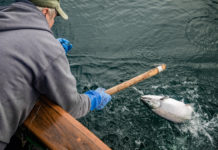While angling remains at a virtual standstill because of Covid, I thought I might recap for readers on a memorable visit to the Bahamas. The trip came about following a visit to Delphi Lodge in Leenane, Co Galway. Over dinner, the then proprietor Peter Mantle, said: “Derek, when I have Delphi Club in Abaco up and running, you must come and visit us.” Needless to say, I didn’t need a second invite!
The unabridged article below appeared in The Irish Times Saturday Magazine with my photograph on the outside cover fishing from a skiff on the Marls.
Pound-for-pound, these sportfish are the fastest and strongest I have ever encountered
“Eleven o’clock, moving left to right, 30ft out. Trust me on this one, Derek. Strip, strip, stop, strip,” Ishi whispers. And whizzzzzzzzzzzzzzzz. My first bonefish is on and ripping line from the reel at a rate of knots. I’m down to backing line as the run continues across the flats. Will this fish ever tire? My introduction to fly-fishing in the Bahamas is complete.
Pound-for-pound, these sportfish are the fastest and strongest I have ever encountered. The initial burst can reach 15km/h!
Marjorie Roberts, my taxi driver, is waiting at Marsh Harbour Airport on Abaco Island. “I drive you to Delphi Club to meet Mr Peter. You notice our highway? It is 130 miles straight road from northern point at Crown Haven to Sandy Point in south. It was built for logging industry,” she says.
On arrival at Delphi in Rolling Harbour I meet owner Peter Mantle and general manager Sandy Walker from Cork. “Sandy takes care of everything here at Delphi. Except I look after accounts,” Peter says.
Dinner at 7pm at the big table is the highlight of each day. I opt for shrimp tempura with spicy pineapple salsa starter and pan-fried mahi-mahi with cucumber and white butter sauce. Hot raspberry soufflé completes a sumptuous meal.
Delphi Club is five-star in every respect. The eight double bedrooms, each with verandah, have stunning views over a white sandy beach and the blue waters of the Atlantic.
Garret Reid, resident chef from Armagh, is top drawer. The big room is immaculately furnished with fishy themes and a great library. An outdoor heated swimming pool captivates this fisherman’s paradise.
Mantle built Delphi in 2008 on 5.5 acres at a cost of €6 million. “My family own 50 per cent, I have 36 investors and the Bahamian Bank met the balance.”
Following breakfast our four Dolphin skiffs, each with two anglers and boatman, are powered off at breathtaking speed to the Marls, an area of some 300 square miles of crystal clear shallow water interspersed with Mangrove trees.
I am paired with Steve from England and boatman Ishi, a native of Abaco and dab-hand at bonefishing. I see barracuda, shark, garfish and shad scudding in the shallows and muted herons hovering overhead.
And there are bonefish. Lots of them. Silvery ghosts with tails often breaking the surface as they burrow for crabs, their favourite food. Sometimes they hunt in packs, often as loners.
Fishing for bonefish looks easy but there is a skill involved as I find out. Yes, I have the 9ft rod with sinking tip and shooting head and, yes, the Delphi diva fly to resemble a crab-like creature is guaranteed to work wonders.
But, alas, these fish seem to sense my lack of experience! Ishi is stationed on the raised platform behind me, slowly and silently sculling the 17ft stiff-pole as he peers the shallows for bonefish. “I spot bones at 85ft,” he says. I await the call.
Quietly spoken, I hear: “Derek, two o’clock, three of them, coming towards the boat. Cast now. Let it sink. Strip, wait. They’re moving away. Try again. Faster, Derek.” Panicking, I entangle the line under my feet and form a lovely bird’s nest. I have spooked the fish and they’re gone.
Throughout the day I interchange with Steve and soon begin to tick all the boxes required to catch these artful strategists. I am duly rewarded and at close of play can boast four bonefish to the boat and umpteen near misses. Each weighs about 2kg (4.4lb) and barbless hooks ensure a safe return to the Marls.
After dinner I visit Pete’s Pub and Gallery in Little Harbour. The shanty-style bar at the water’s edge is renowned for its seafood dishes and typifies Bahamian outdoor nightlife with loud samba music and locals playing dominos.
The bronze foundry alongside the pub is owned by sculpture Peter Johnston and is a wonderful example of a 5,000-year-old lost wax process. The gallery depicts bronze and gold pieces of marine wildlife from the island. I order a bronze bonefish!
On the road again, I arrive at Marsh Harbour in time for the early Albury ferry to Hope Town, a 20-minute journey. The settlement is small with two narrow thoroughfares for pedestrians, bicycles and cars. I take a 10-minute stroll and ask for directions: “Can you tell me the way to town, please?” A bemused resident replies: “Sir, you have just passed it!”
Chimed music bellows across the settlement: “This is my story, this is my song . . .” and I decide to find the source. It is, of course, noon and the recorded music originates daily from the Baptist church.
Cap’n Jacks overlooking the harbour for lunch is memorable. The restaurant is one of the best in town and specialises in Bahamian food. Most patrons arrive by boat and embark via stepladder from the rear of the premises to the diner.
From Marsh Airport I return to Nassau and on to Deadman’s Cay Airport on Long Island. I sit on the bench seat at the rear of the 20-seat plane. The 45-minute flight necessitates a five-minute stop at Cherokee to collect two passengers!
The airport at Deadman’s Cay is tiny with just one receptionist and one bag man. My hosts, Charles and Teresa Knowles and children, whisk me to their beautiful house for a welcome lunch.
Long Island is about 80 miles long with a population of 4,000. The Knowles, Cartwright and Deans form 80 per cent of the local telephone directory. “Today, we go for boat ride to the bay to see manta ray and shark,” Charles says. His 30ft speedboat is powered by a 200hp outboard engine and cruises at 45mph.
Soon we are among the big fish. In clear shallow water he points to dark shadows of massive ray, shark and barracuda feet from our boat. On an ebbing tide he jumps from the boat and lifts beautifully coloured starfish, each about 300mm in diameter.
He continues barefoot on the wet sand to retrieve several conch or “konk”, the stable Bahamian diet. Conch is a slow-moving marine snail weighing about 1kg.
Over dinner I order deep-fried conch and chips at Jerry Wells Seaside Village roadside restaurant. To my surprise the konk tastes delicious, particularly when washed down with island-brewed Kalik beer.
Charles is an energetic young man with many talents. Apart from fishing, he sells land crabs by the thousand; dives on coral reefs for sponges; landscapes new housing investments and played the leading role in the award-winning film Open Your Eyes.
In 2007, hurricane Noelle left thousands of bonefish washed up dead on the island. “We were lucky because stocks came back. Water levels reached 7ft high on Queen’s Highway,” Charles says.
My beachfront self-catering lodgings at Salt Pond overlook Grotto Bay, venue for the annual Long Island regatta. The Turtle Room has all mod cons including wireless internet, TV and exclusive use of a sandy beach.
At Grotto Bay, hosts Jean Pierce and Kris Newman provide a lighting tour of an extensive cave system with still-forming stalactites and stalagmites. The three-chambered cave harbours five species of bat and is one of the largest in the Bahamas.
The islands are beautiful, rich in culture and heritage, and boast a “guarantee” of glorious sunshine
After breakfast I am underway to the “back country” of the Marls with bonefish guide Philip Cartwright. “Today, you will catch many bonefish,” he says. Cartwright has lived in Deadman’s Cay all his life and is married with four daughters.
The system is the same as before. I stand on flat bow and Philip is on a raised platform at the stern, slowly sculling between the mangroves. I am at the ready and feel confident.
The words resound in my ears: “Group. Ten o’clock. Get it off, now. Strip, strip. Yes, you’re in. Keep pressure on,” Philip blares. The ferocity of the take and speed of run creates a burn mark on my index finger as the line pours from the reel.
In the course of the day, Philip stalls the boat and decides to fish 30 metres from the boat barefoot in knee-high water. This method is very productive because it reduces chances of spooking the fish. “Aren’t you afraid of the crabs?” I ask. “Just the odd one nips you on the toe, but that’s okay,” he says. His “bunny rabbit” shrimp fly-pattern appeals to the fish and I end the day with eight bonefish.
My time in the Bahamas is complete. May I say I was bowled over with the warm and friendly welcome afforded to me during my visit. I was treated like one of the family.
The islands are beautiful, rich in culture and heritage, and boast a “guarantee” of glorious sunshine. With over 50 years of angling under my belt this bonefishing is the most spectacular, rewarding and enjoyable I have ever encountered. The Bahamas is the capital of bonefishing.
I travelled as a guest of Delphi Club, Abaco and Bahamas Tourist Office UK for flights and Long Island venture.
angling@irishtimes.com.
Credit: Source link






























